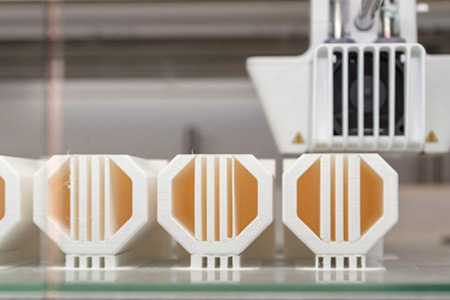September 28, 2021

Jaemi Rowe
The Image Permanence Institute received a National Leadership Grant for Museums from the Institute of Museum and Library Services in the amount of $375,543 to support a three-year research project that will identify critical preservation challenges associated with 3D printed materials and technologies found in museums and develop resources that will support 3D printed object preservation.
The rapid growth of the 3D printing industry and the continued rise of 3D printed objects poses a challenge for collections stewardship, as museums will be responsible for preserving the material record and history of this technology. Many museums are already consumers of 3D printing technology, using it in applications such as preservation activities, storage, display, transit of objects, and education and engagement. The increased presence of 3D printed objects in collections and instances of use in preservation activities amplifies the critical need for preservation guidelines and resources for museum professionals caring for these objects. However, the scope of 3D printing in museums, including how museums create, collect, and consume 3D printed objects, remains ill-defined. The foundational research in this project will identify usage trends in 3D printing among museums as well as develop research strategies and resources that will guide the preservation of 3D printed materials.
Project activities will be led by Dr. Meredith Noyes, IPI Research Scientist, and will involve collaboration with RIT’s Center for Additive Manufacturing and Multifunctional Printing (AMPrint Center). Major grant activities will include a field-wide survey to determine the current state of 3D printing among museums, interviews and site-visits with 3D printing industry leaders to inform a web-based resource for object preservation, and the creation of a 3D printed research collection to support continued research and education. Project outcomes will be added to the 3D Printed Materials page as they are developed and will continue to be updated throughout the project period.
In 2004, IPI released ClimateNotebook, the first desktop software designed specifically for libraries, archives, and museums to graph environmental data and generate reports with preservation analysis. In 2012, eClimateNotebook (eCNB) was launched. A web application that synthesized the strengths of ClimateNotebook, and IPI’s other preservation management tools (MyClimateData and PEMdata) into a single, unified platform.
The Image Permanence Institute has been awarded $315,854 from the National Endowment for the Humanities Research & Development grant program to support a three-year research project titled, Evaluating the Mechanical Stability of 3D Printed Materials to Inform Collections Care Decision Making for Preservation and Access.
IPI is looking for a new team member in a redefined Sustainable Preservation Specialist role. The Sustainable Preservation Specialist supports professionals working in collecting institutions with environmental monitoring and sustainable preservation practices. They assist collecting institutions with basic environmental monitoring and data analysis, advise on logger placement in collection storage and exhibition spaces, and provide instruction on the use of IPI’s data management and analysis software, eClimateNotebook.
Xinxin Li is IPI’s new 3D Design Assistant working under the supervision of Meredith Noyes, Research Scientist, as part of the IMLS-funded project Foundational Research to Inform Preservation Guidelines for the Creation, Collection, and Consumption of 3D Printed Objects in Museums. Xinxin is a MFA candidate in Industrial Design at RIT and comes to IPI after receiving her BFA in Industrial Design from Savannah College of Art and Design.